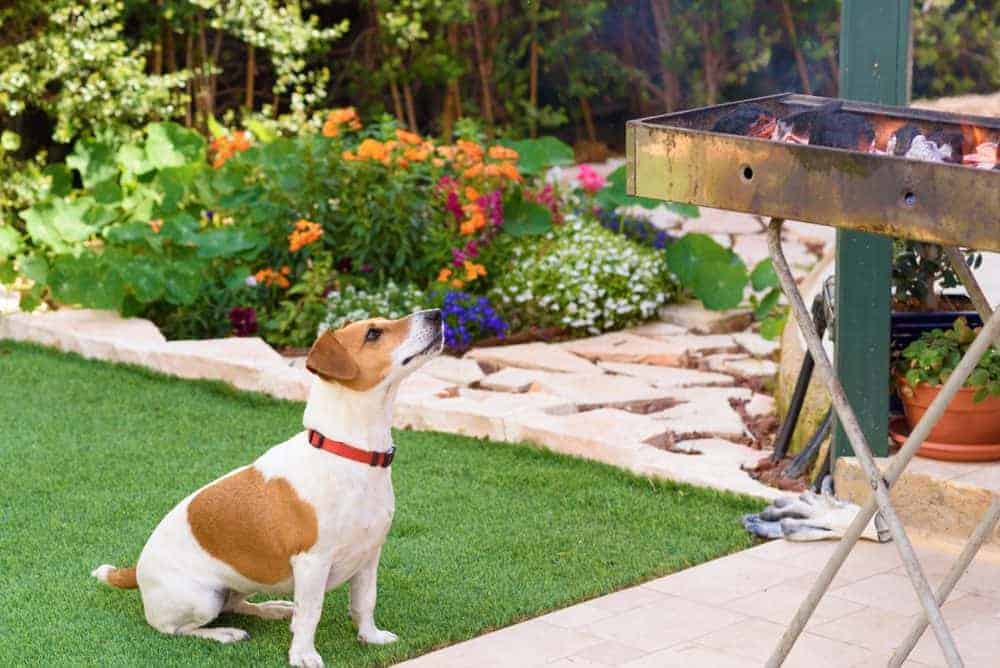
Barbecues and pets can be a recipe for disaster, unless you take precautions to ensure the four-legged members of your family stay safe. According to animal hospital charity PDSA, every summer, their vets see lots of pets who’ve got into a spot of bother at the family barbeque – whether its burns, bin raids, broken glass, heatstroke or getting stressed by noisy groups of strangers.
Emergency vet Aoife Reid, of Vets Now, agrees that there’s a similar pattern among the pets they treat during the summer months: “We see a number of unusual injuries at this time of year as barbecues and summertime parties in particular can be hazardous for pets. As well as swallowing kebab skewers, eating cooked bones, developing food poisoning, or sustaining burn injuries from stealing piping hot food from the barbecue, pets can also sustain traumatic injuries such as getting their tails stuck in patio doors.”
However, such calamities can be avoided – as long as you plan to make your party pet-safe. Simply follow our 5 top tips:
1. Keep pets away from the barbecue area
The delicious smells emanating from barbecuing food are incredibly attractive to dogs and cats and, for noted food thieves, may be just too tempting for them to resist. In the blink of an eye, a determined pet could snatch some sizzling sausages off a burning grill – the aftermath of which just doesn’t bear thinking about. Always screen off the area where you’re doing the cooking and make it pet-proof. Keep animals well away until all the hot coals and ashes have completely cooled down.
2. Be aware that party food is a no-no for pets
Ask your visitors to resist those pleading eyes and avoid feeding any barbecued food to your pets – it really could make them very ill. Foods high in fat and grease drippings can cause inflammation of the pancreas (pancreatitis) which can be very serious, and sometimes fatal. Sausages swallowed whole can cause stomach ulcers and dehydration. Raw meat can cause food poisoning and cooked bones (particularly chicken) tend to splinter – which could result in sharp pieces that can puncture the oesophagus or intestines. Even the humble corn-on-the cob can be extremely dangerous – a swallowed whole cob is too large to be digested and will likely mean surgery is required to remove it. PDSA recently had a case of this where an emergency operation was required to save a dog's life.
Other foods often found at barbecues – such an onions, avocado, grapes, chocolate, chives and garlic – are also toxic to pets. Keep all food stuffs in tight-fitting containers so that curious noses can’t seek them out. Alcohol should also be kept well out of reach of thirsty pets looking for a drink.
TOP TIP
To keep your pets occupied while you’re enjoying your food, give them a healthy chew to munch on or a fun toy such as a treat ball to play with.
3. Keep things tidy
Pets, particularly dogs, are incredibly skilled at sniffing out tasty leftovers – including what they’ve been wrapped in. Aluminium foil, plastic wrap and kebab skewers covered in grease should be tidied away in a raid-blocking lidded bin as these can be very dangerous, causing intestinal blockage if ingested.
4. Know where your pet is
Having lots of strangers around can be very stressful for some pets, so set up a quiet, cool room in your house where they can retreat to. Some dogs love all the extra attention and may get over-excited and too hot – so it’s down to you to make sure they take some time out.
Pets who live in the garden, such as rabbits and guinea pigs, may be frightened by the noise of a big group of people. Try and keep guests away from their run or move their enclosure into a quieter spot.
Visitors can mean lots of coming and going – so make sure your pet doesn’t seize the opportunity to slip out through an open door. Keep a watchful eye on them so they don’t accidently get shut in a conservatory or greenhouse – these can heat up very quickly and cause heatstroke, a life-threatening condition.
5. Protect your pets from the sun
Our furry friends can quickly overheat, so make sure they have plenty of cool, fresh water and can head into the shade or indoors whenever they need to. Sun-loving pets also need sunscreen just like us – use a pet friendly one, paying particular attention to those pets who have thin or white fur, or pink skin exposed at the tips of the ears, tummy or end of the nose.
If you found this interesting, you may also like:
Help your pets to chill out this summer
From hi-tech cooling products to tasty chilled treats, we’ve lots of ideas to help your animal pals cope with hot weather.
Some like it hot
Cats are the ultimate sunseekers – bagging themselves the sunniest spots for a snooze, even on a hot day. But have you ever wondered why?
Summer first aid for pets
Fleas, ticks, stings and even snakebites... summer brings out all manner of creepy crawlies that can prove problematic for pets. Our in-house vet Dr Suzanne Moyes has some seasonal advice.
How pet friendly is your garden?
Love to spend time in your garden with your pets? Ever thought about how safe is it for them? Here are 7 steps to follow to ensure your garden passes the pet-safe test...
Wet and wild
Dogs and water mean fun times for our four-legged pals on a blazing summer’s day – as long as you choose the right swimming locations and avoid potential hazard hot-spots.
Are you going down to the woods today?
Here’s what you need to know if you and your dog are going wild in the country…
Sources: pdsa.org.uk, vets-now.com, petmd.com














